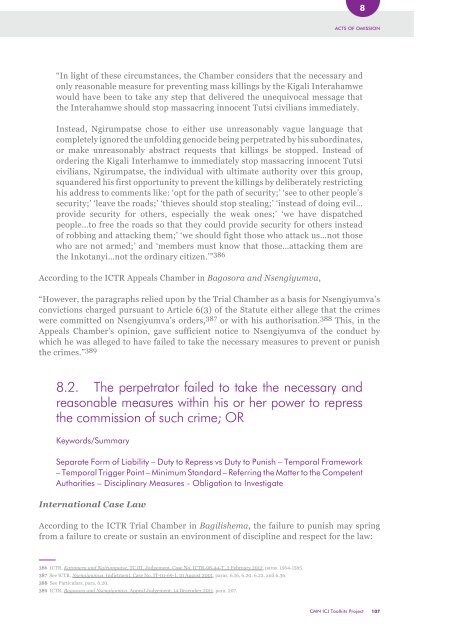Command Responsibility
CMN_ICL_Guidelines_Command_Responsibility_En
CMN_ICL_Guidelines_Command_Responsibility_En
Create successful ePaper yourself
Turn your PDF publications into a flip-book with our unique Google optimized e-Paper software.
8<br />
ACTS OF OMISSION<br />
“In light of these circumstances, the Chamber considers that the necessary and<br />
only reasonable measure for preventing mass killings by the Kigali Interahamwe<br />
would have been to take any step that delivered the unequivocal message that<br />
the Interahamwe should stop massacring innocent Tutsi civilians immediately.<br />
Instead, Ngirumpatse chose to either use unreasonably vague language that<br />
completely ignored the unfolding genocide being perpetrated by his subordinates,<br />
or make unreasonably abstract requests that killings be stopped. Instead of<br />
ordering the Kigali Interhamwe to immediately stop massacring innocent Tutsi<br />
civilians, Ngirumpatse, the individual with ultimate authority over this group,<br />
squandered his first opportunity to prevent the killings by deliberately restricting<br />
his address to comments like: ‘opt for the path of security;’ ‘see to other people’s<br />
security;’ ‘leave the roads;’ ‘thieves should stop stealing;’ ‘instead of doing evil…<br />
provide security for others, especially the weak ones;’ ‘we have dispatched<br />
people…to free the roads so that they could provide security for others instead<br />
of robbing and attacking them;’ ‘we should fight those who attack us…not those<br />
who are not armed;’ and ‘members must know that those…attacking them are<br />
the Inkotanyi…not the ordinary citizen.’” 386<br />
According to the ICTR Appeals Chamber in Bagosora and Nsengiyumva,<br />
“However, the paragraphs relied upon by the Trial Chamber as a basis for Nsengiyumva’s<br />
convictions charged pursuant to Article 6(3) of the Statute either allege that the crimes<br />
were committed on Nsengiyumva’s orders, 387 or with his authorisation. 388 This, in the<br />
Appeals Chamber’s opinion, gave sufficient notice to Nsengiyumva of the conduct by<br />
which he was alleged to have failed to take the necessary measures to prevent or punish<br />
the crimes.” 389<br />
8.2. The perpetrator failed to take the necessary and<br />
reasonable measures within his or her power to repress<br />
the commission of such crime; OR<br />
Keywords/Summary<br />
Separate Form of Liability – Duty to Repress vs Duty to Punish – Temporal Framework<br />
– Temporal Trigger Point – Minimum Standard – Referring the Matter to the Competent<br />
Authorities – Disciplinary Measures - Obligation to Investigate<br />
International Case Law<br />
According to the ICTR Trial Chamber in Bagilishema, the failure to punish may spring<br />
from a failure to create or sustain an environment of discipline and respect for the law:<br />
386 ICTR, Karemera and Ngirumpatse, TC III, Judgement, Case No. ICTR-98-44-T, 2 February 2012, paras. 1564-1565.<br />
387 See ICTR, Nsengiyumva, Indictment, Case No. IT-01-69-I, 10 August 2001, paras. 6.16, 6.20, 6.22, and 6.36.<br />
388 See Particulars, para. 6.20.<br />
389 ICTR, Bagosora and Nsengiyumva, Appeal Judgement, 14 December 2011, para. 207.<br />
CMN ICJ Toolkits Project<br />
107


